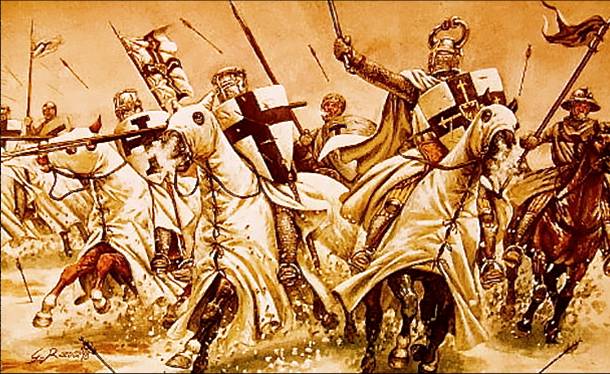St. Thomas Aquinas was perhaps the most important figure of the Catholic Church during the Middle Ages. This lesson examines what he did to help protect the Church against a rebirth of critical thinking by using critical thinking to defend the Church.
Who Was Thomas Aquinas?
Have you ever had an argument with someone and ended up arguing on two completely different planes? Sure, your mom is all about you cleaning your room, but she doesn’t understand what your friend just sent you on social media is having a major impact on your life.
In 13th century Italy, that’s the sort of challenge faced by Thomas Aquinas, a Catholic priest who would become one of the greatest thinkers of the Middle Ages. He was a defender of the faith at a time when Catholicism was under attack by those who sought to apply strict rules of Aristotle’s logic. Sure, the arguments of Aristotle didn’t make a great deal of sense to everyone who was closely associated with the Church, but as we’ll see in this lesson, they were a danger to the future of the Church as it was viewed by those who were at the edges of its influence.
The State of the Church
To really understand just how dangerous Aristotle was to the Church, you’ve got to understand how medieval education worked. So let’s say that you had signed up to be a priest. Now if you showed only average intelligence, you’d be taught to read and write before spending out the rest of your days as a village rector. However, if you showed great intellectual prowess or if a powerful bishop had taken a liking to you, then the world of universities were suddenly opened to you. Here you’d be expected to not only read the great religious works of the day but also works in Greek or Latin to gain familiarity with those languages.
Admittedly, the assigned texts were often stuffy. However, some enterprising scholars started to read works by more eloquent authors, Aristotle being one of those. Eventually, his teachings became more and more influential, to the point of being used by some to directly challenge Church dogma. This was a problem for the Church, as you might imagine. It was enough to deal with heretics and infidels, but it was completely something different to have to contend with discontent in the ranks.
Thomas Aquinas with a Solution
For quite some time, the Church had taken the approach of simply fighting these disputes with more Church law. As you can imagine, this didn’t always make the most sense. Then along comes Aquinas. He became one of the first Church leaders to take an interest in Aristotle and other Greek writers. However, his interest didn’t lay in trying to destroy the Church’s ideals. Instead, he saw an opportunity to use the logic of Aristotle to help defend the Church. In fact, many times he took it further and used the arguments of Aristotle as proof of the importance of the Church.
In short, Aquinas sought to prove both the existence of God and the importance of the Roman Catholic Church through his work. His most famous piece, Summa Theologica, did just that. The book was the defense of Aquinas against every type of misdeed he could think of, from a small sin to being Muslim or pagan. All the while, he made use of the same Aristotelian logic that had threatened the church leaders only a few years prior. In doing so, he left the Roman Catholic Church a much more agile and reflexive body.
Legacy
For doing so, Thomas Aquinas was well honored. Within a century of his death, he was recognized as a Saint. However, that is perhaps not what he is most well remembered for. Aquinas was in many ways the first to combine objective study of philosophy with a devoted study of theology. As such, he is even more highly regarded within the Church. He is a patron saint for many educational endeavors.
Lesson Summary
Alright, let’s review. In the 1300s, the Roman Catholic Church was the preeminent religion in Western Europe, but it was starting to gain increasingly substantial amounts of criticism as the works of the ancient masters, particularly Aristotle, were becoming more and more widely read. After all, these works shows points where the teachings of the Church could be interpreted as illogical. Luckily for the Church, Saint Thomas Aquinas was able to not only defend the Church but also turn many of these newfound arguments against the Church on their heads. In particular, he adopted the teachings of Aristotle to defend the Church against those who would criticize it. As a result, Saint Thomas Aquinas remains one of the most well-revered saints in the canon.
Source: https://study.com/academy/lesson/how-thomas-aquinas-saved-the-faith-from-reason.html



